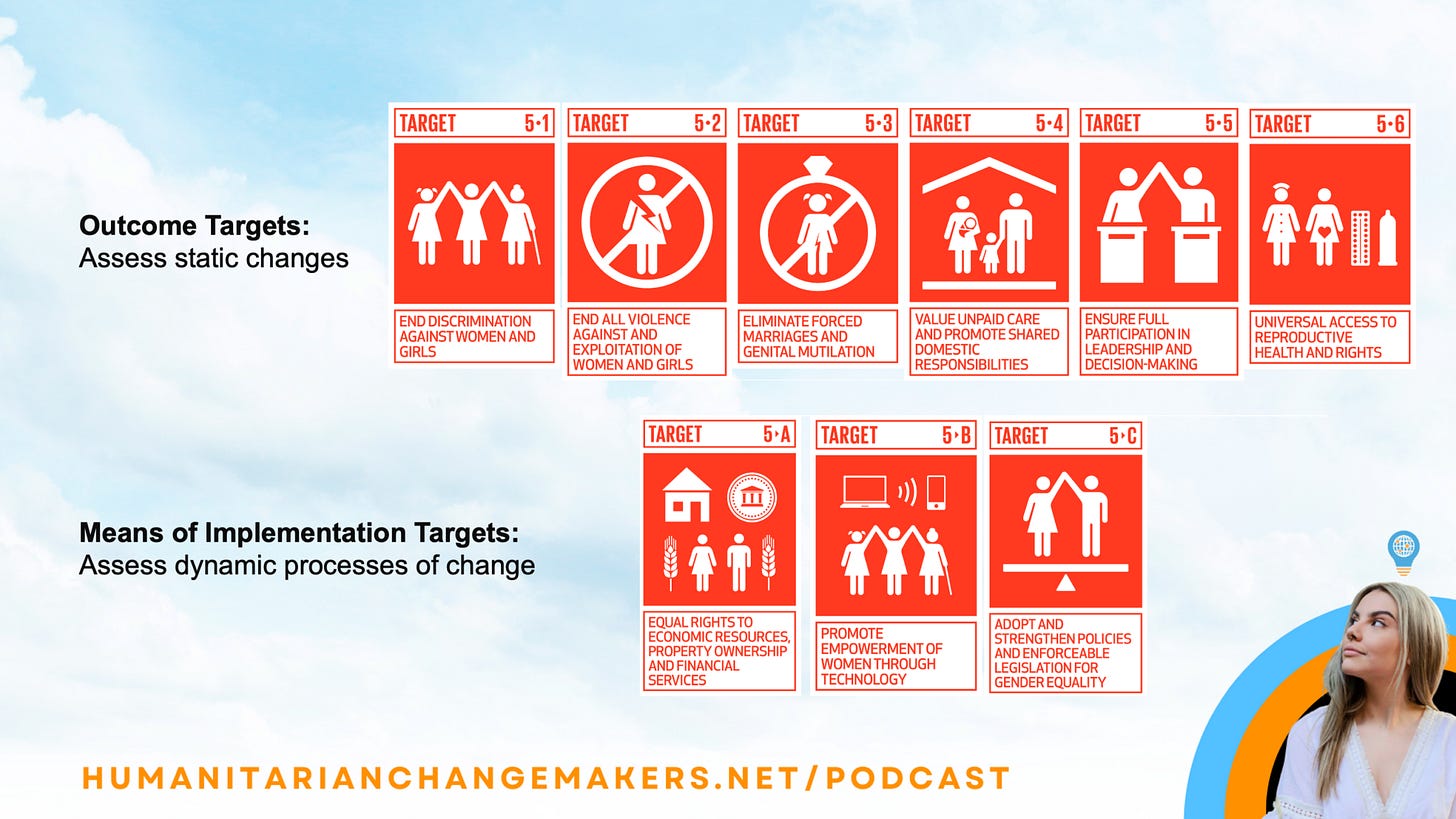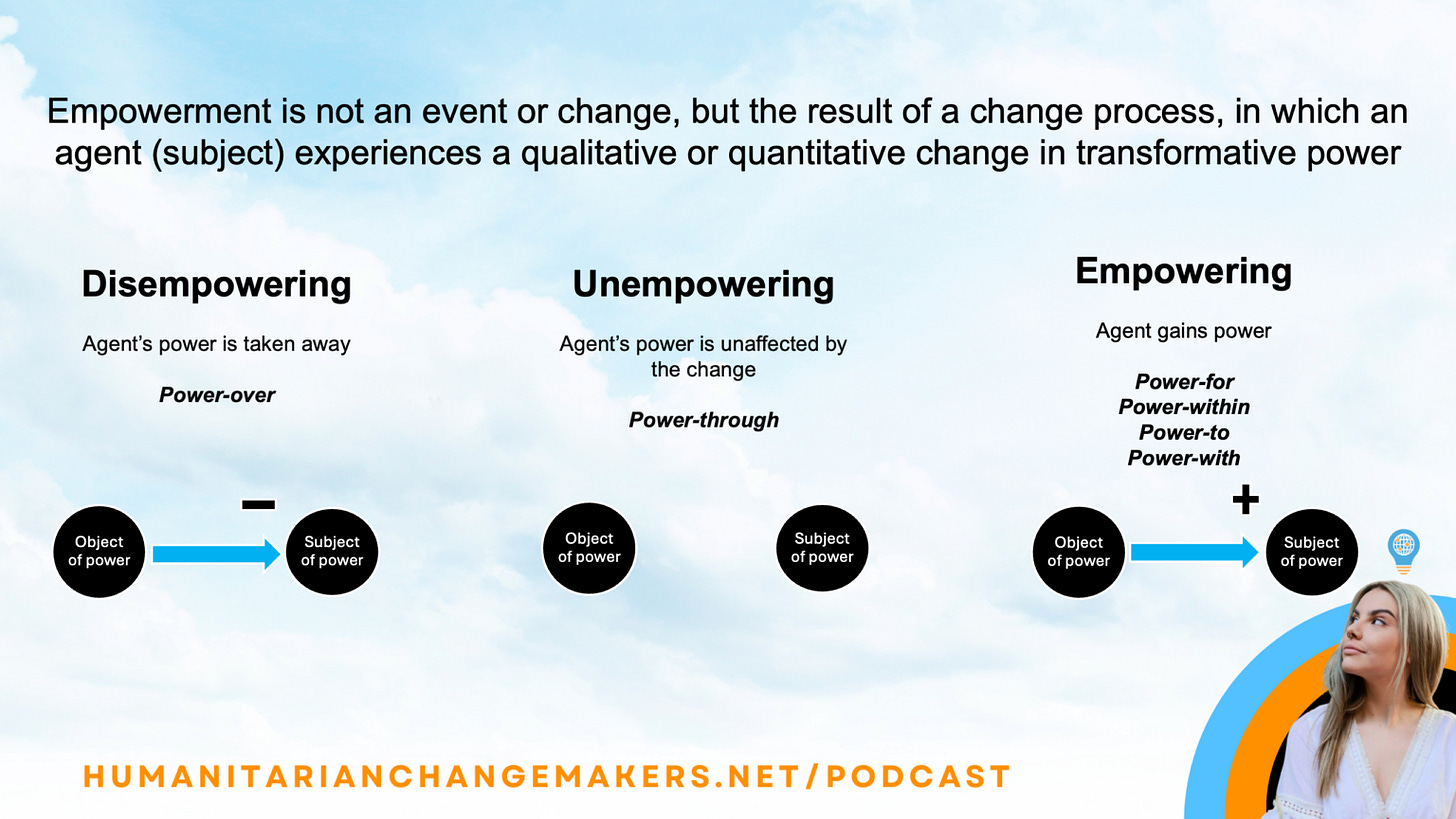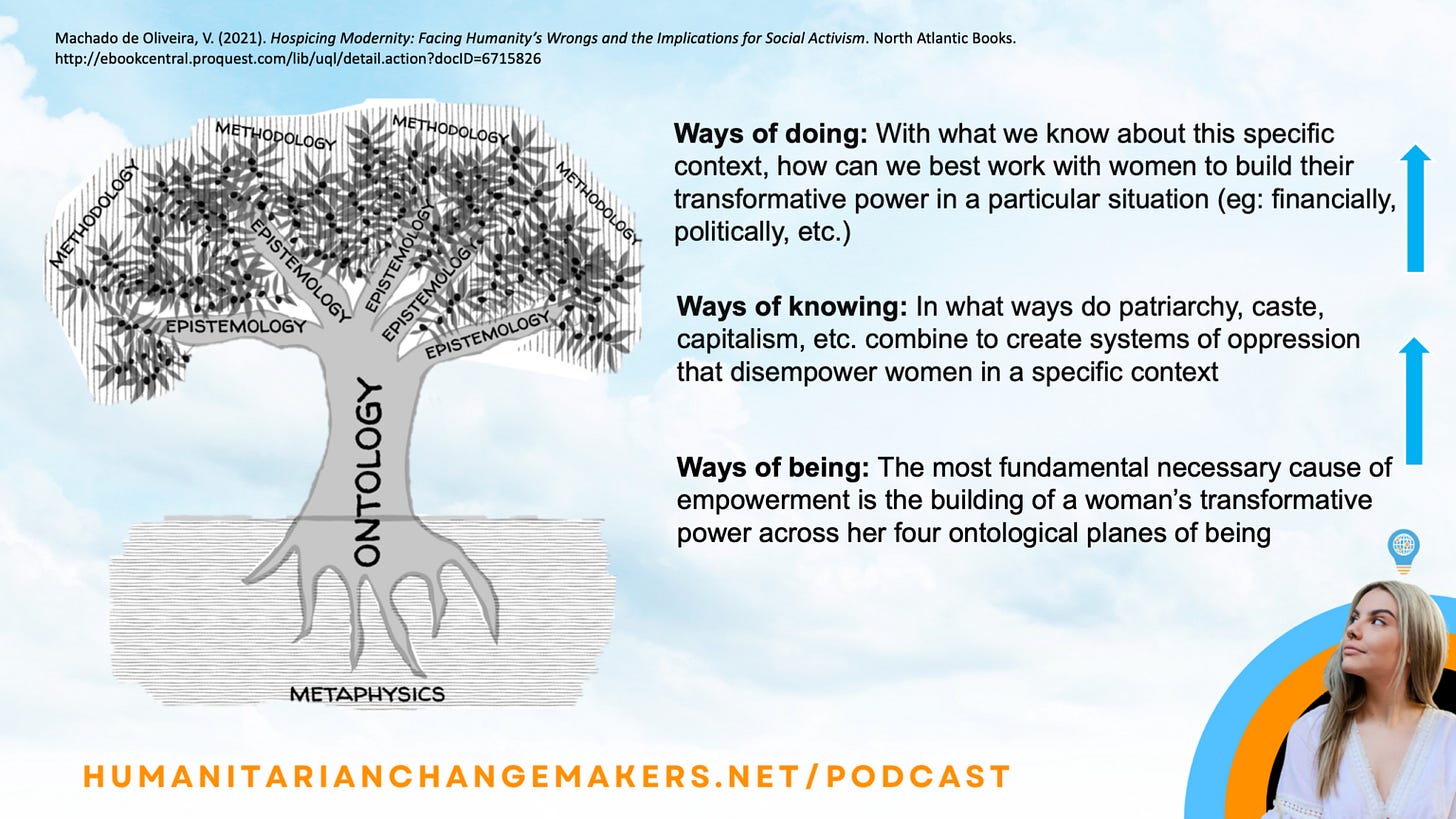Social Ontology, Power, and Modernity: Empowerment as a Theory of Transformative Change
016. Sharing my empowerment framework!
This episode of Changemaker Q&A is an exciting one- I'm finally ready to share my explanatory framework of empowerment from my doctoral research! After presenting the framework at an international conference (I'll share the paper here when it's published), I wanted to share the philosophy/theoretical underpinnings of the framework for anyone who is interested in how/why my research took me in this direction. It might seem like women's empowerment is something that is well-researched, but since empowerment emerged in the development field in the 1970s, it has become somewhat of a buzzword, and we often assume that any efforts that promote gender equality will automatically empower women – but the two are fundamentally different.
Equality VS Empowerment
If we look at the 5th of the UN’s Sustainable Development Goals, SDG target 5.B explicitly aims to empower women through information technologies. But, if we look at the sole indicator offered by the SDG framework to measure women’s empowerment through technology, this is the indicator: the proportion of women to men that own a mobile phone.
The problem with this is that it focuses on outcomes, not processes. And this might work for something like women’s rights, or gender equality, because we measure these through changes – static difference.
As early as the 1990s, Indian women’s rights activist and scholar Srilatha Batliwala expressed concern about the growing popularity and generalisation of the term empowerment, warning that empowerment was in danger of losing its transformative edge.
She called for a more precise understanding of both power and empowerment, and the only way we can do this is to move the focus of empowerment beyond ways of doing or ways of knowing, to uncovering ways of being.
The Philosophy of Change
Vanessa Machado de Oliveira’s book Hospicing Modernity uses the analogy of an olive tree to illustrate the metaphysics of modernity, and the approaches we take when dealing with the problems of modernity.
The leaves of the tree represent methodological approaches, which focus on ways of doing. These are prescriptive, and they assume that the system isn’t operating as effectively as it could, so they engage with affected parties, proposing new solutions, and more effective methods of implementation.
The branches represent epistemological approaches, which focus on ways of knowing. These are more descriptive, and they take more contextual and historical analysis and prioritise centring the voices of those with lived experience of social injustices, aim to offer contextually and culturally appropriate solutions, through redistribution, redress, and reparation to ‘fix’ the system.
The visible trunk and invisible roots represent the ontological layer, which form the basis of the tree and influence the growth of the branches and the leaves. Ontological approaches consider the fundamental notions about reality, self, consciousness, time, space, and change. Frameworks here move beyond description or prescription and must hold space for and work with complexity. There is a shift in ontological approaches from fixing the system to unravelling deeper structures of being, recognising that ways of knowing (modernity) cannot address the problems it created, and we must be willing to explore beyond the known possibilities, and moving from action-oriented tendencies to engaging with viable yet unimagined horizons.
Most mainstream empowerment frameworks are methodological or epistemological – while we need to explore alternative ways of doing and knowing, these will lack any transformative potential, and they may inadvertently legitimise the systems of oppression, injustice, and inequality it seeks to challenge, by failing to consider what possibilities exist beyond an epistemology that emerges from and is restricted by modernity.
Through the lens of ontology, I developed an explanatory model of empowerment.
Power & the Ontology of Persons
Empowerment, at the most fundamental, ontological level is not indicative of an event or change, but the result of a change process, in which an agent (subject) experiences a qualitative or quantitative increase her transformative power.
Power at the most fundamental philosophical level is the potential for something to cause an effect; transformative power is the potential for someone to exercise agency and transform their social conditions.
We most commonly explore power in the form of power over– which is usually experienced through control or force, and I categorise this as negative power, because it means an agent has transformative power taken away from them, this loss of power that can make the a change process disempowering.
Sometime power expressed through other agents, institutions, or structures, and while these might constrain or enable what is possible for a woman, if it doesn’t causally affect her transformative power, then this is an unempowering change.
If an agent experiences some change and it leads to a qualitative or quantitative increase in her transformative power, this may be empowering.
Empowerment is fundamentally about power.
Moving deeper towards the roots of our olive tree and explore the ontology of a person, we find that there are four planes of reality in which humans exist:
Material transactions – the plane in which people relate to their natural/physical environment. We all exist here in this room physically.
Embodied personality – the psycho-social dimensions of an individual as a stratified person. We all exist through our personality, with unique values, beliefs, likes and dislikes, and ways of viewing the world.
Social structures – the structures and social institutions that agents engage with, their history, and how these may reproduce social ills.
Personal interactions – communication in any social interactions or relationship. How we engage with one another and are perceived differently by each person or group we interact with.
These different ontological planes of reality impact the way we experience or express transformative power:
An increase in transformative power on the plane of material transactions, it is power-for. Power-for, which is the power of possibilities – where something that once existed as an imaged alternative is now something that we have the capacity to materialise.
An increase in transformative power on the plane an individual’s stratified personality is power-within, which is the power of autonomy, which enables women to make decisions that align with their own subjective goals and desires.
An increase in transformative power on the plane of social-structures, is power-to – which is the freedom to do and be, which is all about using agency to speak, act, and shape their own life, and this freedom is constrained by external structural and cultural factors.
An increase in transformative power on the plane of social interactions is power-with, which is the cumulative power that builds from not only taking-action, but inter-action with others.
In a world in which modernity defines development as a linear process that values ‘forward’ progress and growth, we can move from focusing on static differences and incremental changes, to instead building the transformative power of women, and empowerment will emerge naturally from this process of transformative change.
This model speaks to the nature of transformative change itself. Power-for provides the logic for transformative change: the potential for change some possible alternative reality— must necessarily pre-exist any attempt to generate change. Transformative change also requires power-within so women can use their agency and choose to mobilise or materialise these possibilities. Of course change doesn’t just happen from desiring and dreaming, it requires women to take action towards their goals— power-to gives them the freedom to take intentional action. But no one exists in a bubble; it is power-with that is built through partnerships, collaborations, solidarity, relationships, or support with others that makes it possible for this cycle of transformative change to continue not only for her, but to scale to family/village/workplace and so on.
Listen to the full episode:
The framework doesn’t end here: what I have presented to you today is a framework for empowerment that sits at the ontological level of our olive tree – it is up to the rest of us to take this model and add the epistemological branches and methodological leaves.
Click here to read the full episode transcript.








